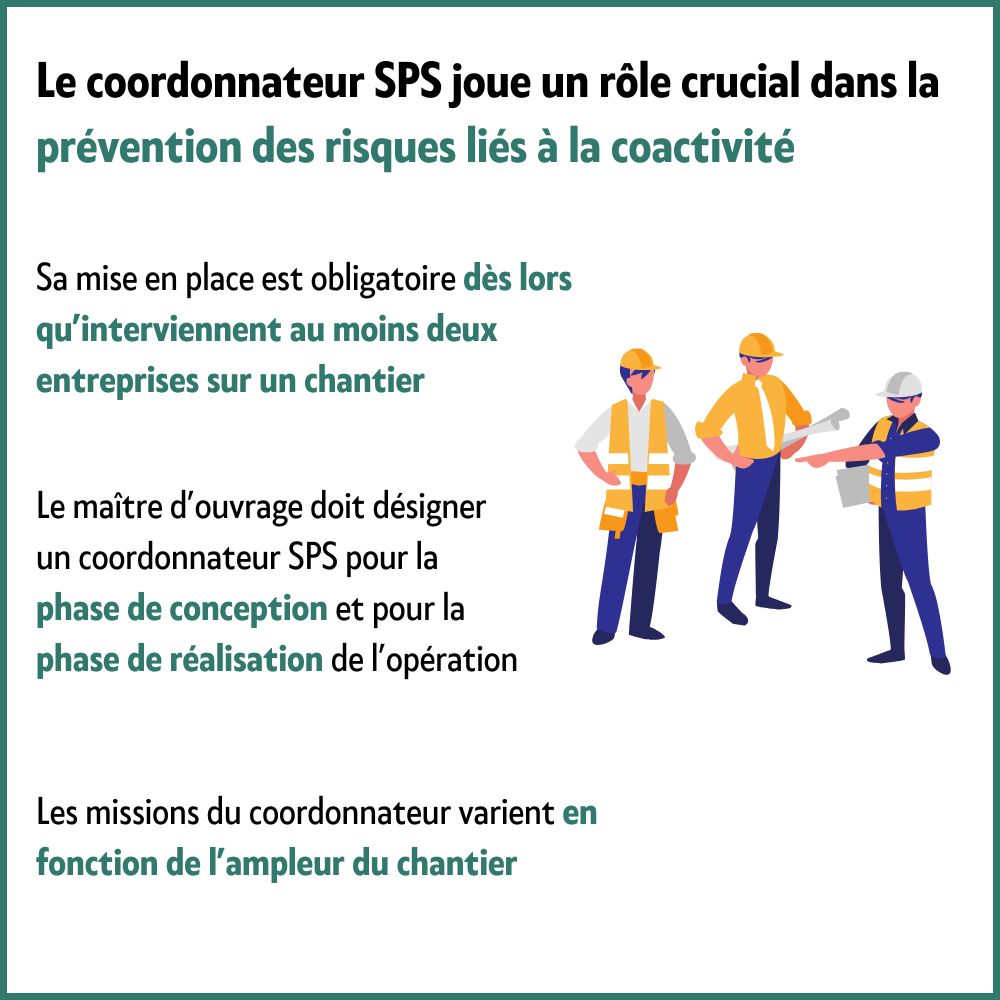The appointment of a health and safety coordinator (SPS) is mandatory when several companies are working on the same construction site. Coactivity generates significant risks, which must be addressed by specific preventive measures.
In this article, you'll find everything you need to know about the role of the SPS coordinator and the owner's obligations in this area.
What is an SPS coordinator and what is his role?
When several companies are involved in a building or civil engineering project, the project owner must set up SPS coordination (Article L4532-2 C. trav.).
⚠️ Note : Self-employed workers and subcontractors are also considered to be companies working on the site.
This coordination has two major objectives:
- Prevent risks resulting from simultaneous or successive interventions by different companies;
- provide for the use of shared resources where necessary: infrastructure, logistics, collective protection, etc.
⚠️ Caution : The SPS coordinator must also take into account the activities of any companies operating in the vicinity of the worksite or directly on the site of the operation (Article R4532-14 C. trav.).
In concrete terms, what are the SPS coordinator's tasks?
The duties of the SPS coordinator vary according to the phase of the operation in which he is involved. The coordinator's intervention is required both during the design phase of the project and during the construction phase.
During the design phase, the French Labour Code specifies that the SPS coordinator is responsible for the following tasks(article R4532-12 C. trav.):
- draw up a general health and safety coordination plan (PGCSPS) where this is mandatory;
- draw up a file of subsequent work on the structure (DIUO);
- open a coordination logbook ;
- define measures for the installation and use of collective protection, lifting equipment, temporary access and general installations, etc.
During the construction phase, the coordinator is responsible for the following tasks(article R4532-13 C. trav.):
- organize the coordination of activities between different companies ;
- ensure the application of the PGCSPS and update it as necessary;
- complete the DIUO if necessary.
More specifically, the scope of the coordinator's duties also depends on the site concerned, and in particular its size. The French Labor Code distinguishes three categories of building and civil engineering worksites (article R4532-1 C. trav.):
- Category 1 worksites: these are large-scale worksites involving at least 10,000 man-days and more than 5 (civil engineering worksites) or more than 10 contractors (building worksites);
- Category 2 worksites: these are medium-scale worksites involving more than 20 workers and lasting more than 30 working days;
- Category 3 sites: these are small-scale sites with fewer than 20 workers and a duration of less than 30 working days.
Coordination tasks for small-scale projects (category 3)
When working on a site in the third category, the coordinator is only required to draw up a simplified general health and safety coordination plan (PGCSPS) when work presenting particular risks is planned for the site.
🔎 Focus : Work considered to present special risks is listed in a decree of February 25, 2003. These include :
- work involving the risk of falling from a height of more than 3 metres;
- work which exposes workers to chemical substances or biological agents requiring medical supervision;
- containment or removal of friable asbestos ;
- ...
This simplified general coordination plan must be drawn up as early as the project design phase, and attached to the dossier de consultation des entreprises (DCE). It must specify the measures to be put in place to prevent the specific risks arising from the interference of this special-risk work with the activities of other companies involved(article R4532-52 C. trav.).
Coordination services for medium-scale projects (category 2)
For sites in the second category, the SPS coordinator must draw up a PGCSPS in all cases(article L4532-8 C. trav.). The content of the PGCSPS is particularly dense, and must include(article R4532-44 C. trav.):
- general site organization measures decided by the project manager in consultation with the site coordinator;
- the health and safety coordination measures taken by the coordinator and the resulting constraints (traffic, handling conditions for various materials and equipment, use of collective protection, etc.);
- difficulties arising from interference with operating activities on the site in or near which the worksite is located;
- the general measures taken to ensure that the site is kept in good order and in a satisfactory state of health;
- cooperation between contractors, employers or self-employed workers.
ℹ Please note : The PGCSPS must be distinguished from the particular safety and health protection plan (PPSPS) which must be drawn up by each contractor before work begins, and which must be forwarded to the SPS coordinator (article L4532-9 C. trav.). In particular, the PPSPS must indicate how the company plans to take account of the coordination measures decided by the SPS coordinator.
Coordination services for large-scale projects (category 1)
Lastly, worksites in the first category are subject to reinforced coordination obligations because of the significant risks they entail for workers.
⚠️ Please note : These obligations are in addition to those already laid down for category 2 worksites.
The project owner must set up an inter-company safety, health and working conditions committee no later than 21 days before work begins(article R4532-77 C. trav.).
Its role is to check that all the rules prescribed by the coordinator are actually implemented. It can also define additional common rules to ensure compliance with the measures put in place (article L4532-13 C. trav.).
This college is chaired by the SPS coordinator appointed for the construction phase of the project and is also made up of :
- the prime contractor appointed by the project owner ;
- contractors ;
- employees working on the site, in an advisory capacity.
ℹ Please note : Companies scheduled to have less than less than 10 workers for less than 4 weeks and which do not carry out work involving particular risks are not required to attend college meetings (article R4532-82 C. trav.).
The college must meet for the first time as soon as at least two companies are present on the site, and then at least every 3 months when convened by the chairman. It must also meet :
- at the request of the majority of representatives with voting rights;
- at the reasoned request of one-third of the members representing the employees ;
- following any accident that has had or may have had serious consequences.

How is the SPS coordinator appointed?
The client must appoint an SPS coordinator for both the design and construction phases.
ℹ Please note : In practice, the client may choose to entrust these tasks to a single SPS coordinator, or to two different SPS coordinators. In the latter case, the coordinator appointed for the design phase must ensure that all documents are passed on to the coordinator appointed for the execution phase.
Another important clarification: when the project owner chooses to appoint a different SPS coordinator for each phase, the coordinator for the construction phase must be appointed as soon as the consultation process is launched (article R4532-5 C. trav.).
Only those with the appropriate training and professional experience can act as SPS coordinators. The precise requirements in terms of qualifications and training are set out in Articles R4532-25 and R4532-26 of the French Labor Code.
What is the SPS coordinator's level of responsibility?
The SPS coordinator carries out his duties under the responsibility of the project owner (article R4532-11 C. trav.). In other words, he or she has no direct authority over the personnel of companies working on the site.
⚠️ Caution : The involvement of the SPS coordinator does not relieve the companies involved of their own responsibility for the safety of their personnel. (article L4532-6 C. trav.).
Nevertheless, the SPS coordinator may be held civilly or criminally liable, particularly in the event of failure to comply with his or her obligations:
- by virtue of the contract with the client (civil liability);
- by virtue of the legal and regulatory obligations applicable to it (criminal liability).
Liability of the SPS coordinator
The scope of the coordination mission must be set out in a contract or specific written amendments(article R4532-20 C. trav.). This contract must define :
- the content of the assignment;
- the resources, in particular financial resources, made available to the coordinator to carry out his duties;
- its obligations, particularly with regard to attendance at meetings.
This means that the SPS coordinator can be held civilly liable if he fails to meet his contractual obligations.
Criminal liability of the SPS coordinator
Finally, the SPS coordinator may also be held criminally liable, notably in the event of an accident resulting from his or her breach of a particular duty of care or safety established by law or regulation.


.svg)



